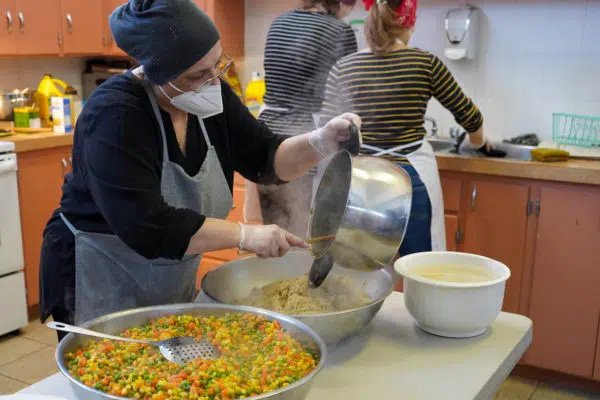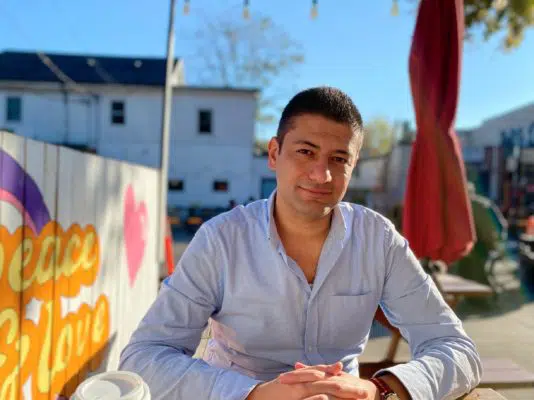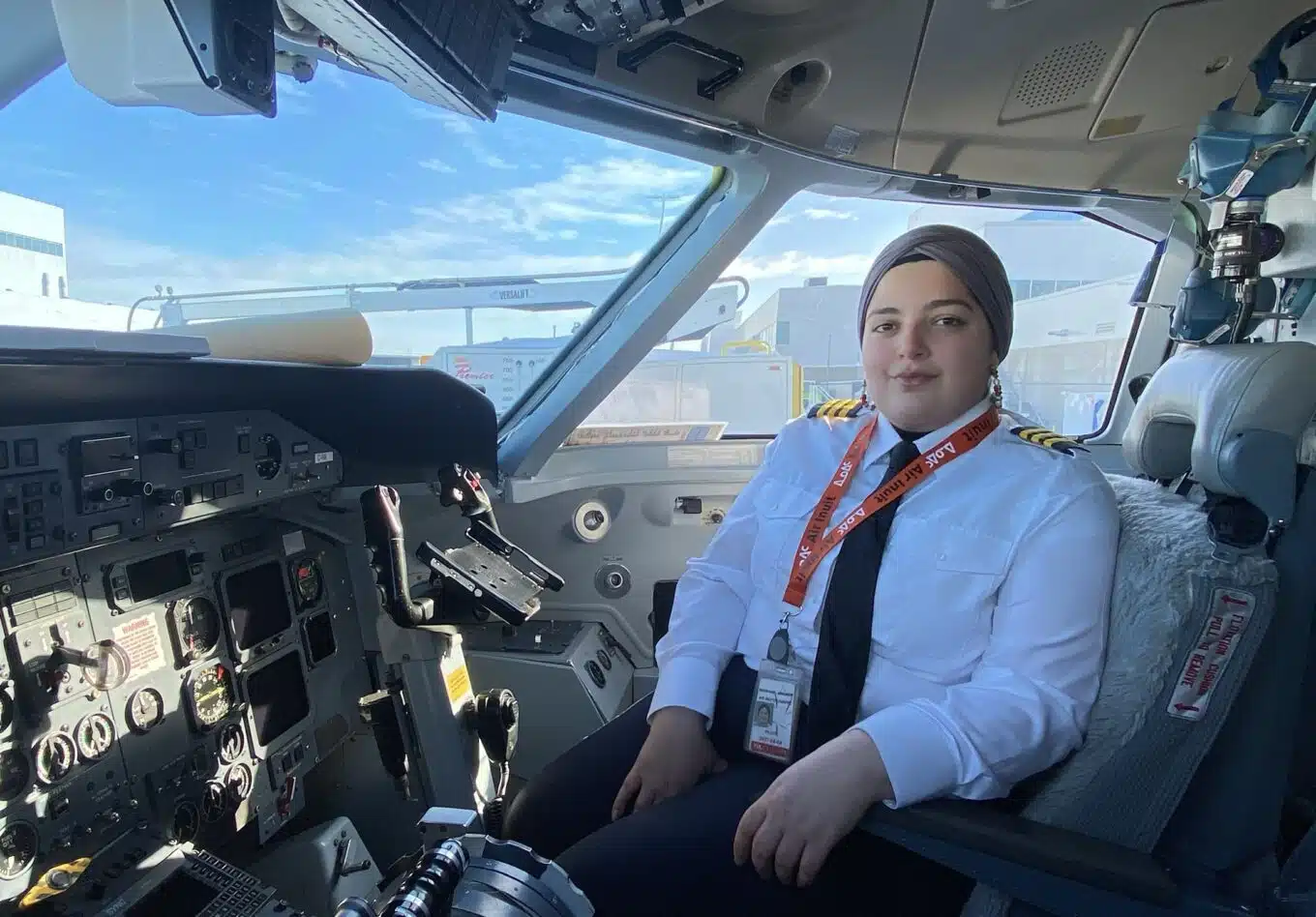
Nour Utayim sits in the cockpit. © Photo courtesy of Nour Utayim.
Nour Utayim embarks on a career in aviation becoming the first female refugee pilot in Canada
By Levon Sevunts
When Nour Utayim puts on her headset, the chaotic world outside the cockpit of Air Inuit passenger airplane goes quiet. As she readies the aircraft for the long journey over the vast expanses of Canadian boreal forests and Arctic tundra, her thoughts shrink into a neat flight checklist.
Batteries – all on. Check.
Main bus tie – tie. Check.
DC gens – on. Check. And on and on and on down the pre-flight checklist.
There is no room on that checklist for worries about family and friends in Syria or Lebanon, no space to ruminate about an argument with a loved one.
“I feel like the second I put on my headset, I disconnect from the outside,” says the 27-year-old former Syrian refugee. “Like if I had a fight with someone last night, I wouldn’t be able to think about it even if I wanted to.”
Nour is not one of your stereotypical bush pilots whose daredevil flying helped connect remote Indigenous communities or mining camps to the mainland during the dawn of aviation in northern Canada. But her pioneering spirit led her to learn how to fly an airplane even before she got her driver’s licence.
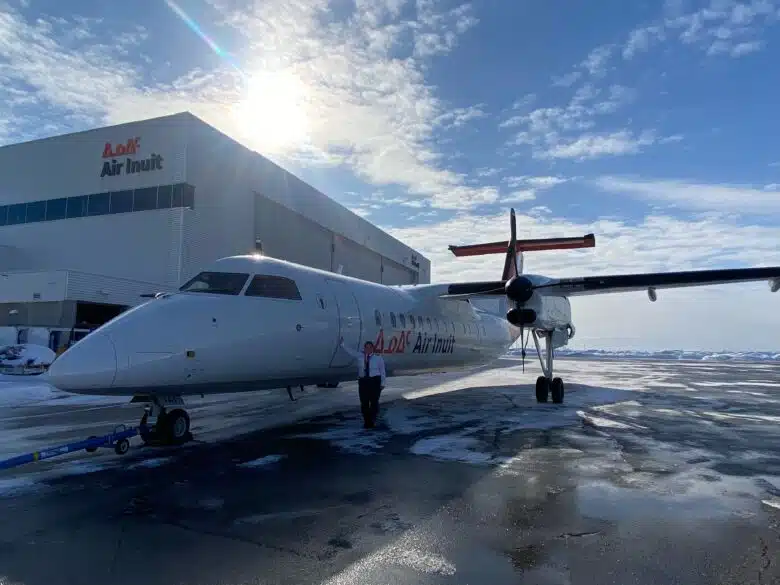
Nour Utayim with a Dash 8 airplane at the Air Inuit FBO terminal, Montreal International Airport. © Photo courtesy of Nour Utayim.
Nour was 17 years old when Syria’s crisis forced her to flee the family home in Damascus to neighbouring Lebanon, where she enrolled at Beirut Arab University to pursue her first passion – architecture.
“I lived there for a couple of years without my family, but it wasn’t getting any better in Lebanon or Syria,” Nour says.
Working in a Syrian restaurant in Beirut, Nour says she earned barely enough money to make ends meet. And when her aunt in Canada who had supported her studies could no longer afford the tuition, she had to drop out of school.
“I went back to Syria for six months to try it again, but it was not safe. I couldn’t see a future there,” she adds. She returned to Lebanon once again.
“I was just dreaming of a better future…”
Desperate to escape Syria’s insecurity and Lebanon’s economic collapse, Nour’s family started looking for a way out. Canada beckoned as a distant dream.
“I was just dreaming of a better future and imagining what my life would be there,” Nour says.
In November 2015, then newly elected Prime Minister Justin Trudeau vowed to resettle 25,000 Syrian refugees to Canada in 100 days. Part of those Syrian refugees were to be sponsored by the federal government and part by private individuals.
Nour’s aunt, who had moved to Montreal years earlier, convinced a church group to sponsor the Utayims – Nour, her mom and two brothers.
But the wait for the coveted Canadian visa was getting more desperate with every passing day.
“It was the hardest period of my life being in Lebanon,” Nour says.
With the economic situation in Lebanon growing more dire, Nour started exploring other options.
“I started looking around to see how I can go to Germany,” Nour says. “I saw how people go to Türkiye. They take the boat to Greece; some survive, some don’t.”
Fortunately, the family’s Canadian papers came through before Nour was forced to join hundreds of thousands of her compatriots on the perilous journey to Europe.
The Utayims landed in Montreal in February 2017.
“I remember being shocked by the amount of snow,” Nour says. “I didn’t know how to dress, and I got sick two days later just because of the cold. But then we quickly learned how to layer.”
Thanks to their sponsors’ generosity and warm welcome, the family started adapting rapidly to their new life in Quebec. They settled in the Montreal suburb of Saint-Bruno, not far from the Saint-Hubert airport, which has several flight schools.
Nour started learning French, still hoping to become an architect.
But one of her French language school projects involved writing an essay on a career path she wanted to explore. With both her late father and grandfather being pilots in Syria and the constant buzz of planes taking off and landing at the nearby airport, Nour decided to explore a career in aviation. She went to a flight school to research her school project. And the more she explored, the more interesting and enticing flying became.
But also, scary.
It costs about $70,000 to study in flight school.
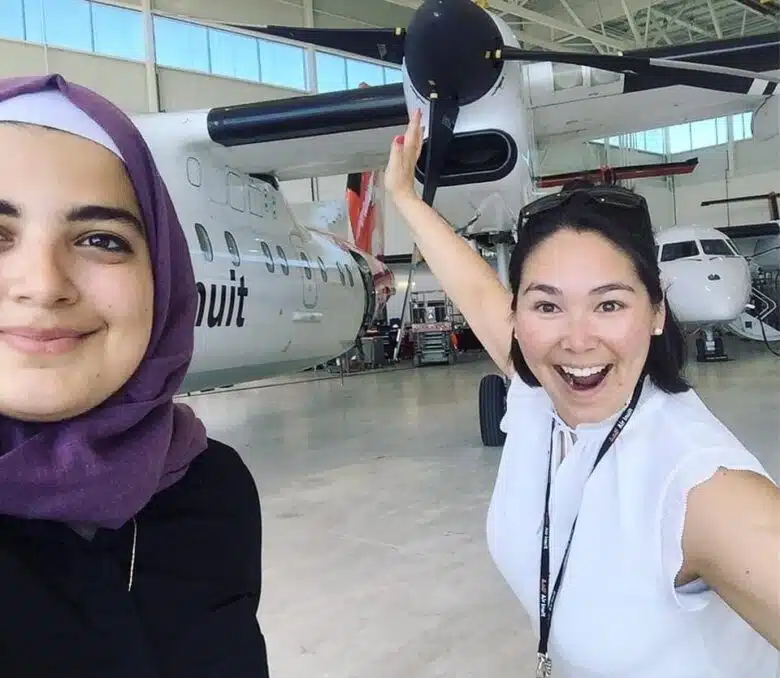
Nour Utayim (left) and Melissa Haney (right) meeting for the first time in 2019 at the Elevate Aviation Cross Country Tour in Montreal.
“It’s a lot of money. When I came here, I had $200,” Nour says. “So, I really had to [make] a big decision because I didn’t have the money. I was going to borrow the money and I had to have a plan B, C and D.”
With a student loan from the bank, Nour began her flight training in February 2018, almost exactly a year after her arrival in Canada. By the time she graduated in September 2019, Nour had impressed the flight school so much, she was offered a job as a flight instructor.
She got more flight hours and applied for another job in Rouyn-Noranda, a mining town about 500 kilometres northwest of Montreal. With more flight hours and experience under her belt, Nour eventually applied for a job with Air Inuit, which services remote communities in Quebec’s northern Nunavik region.
Melissa Haney, a pioneering female pilot, became Nour’s mentor at Air Inuit. The two women met in 2019 during an event organized by Elevate Aviation, a non-profit dedicated to introducing women to careers in aviation.
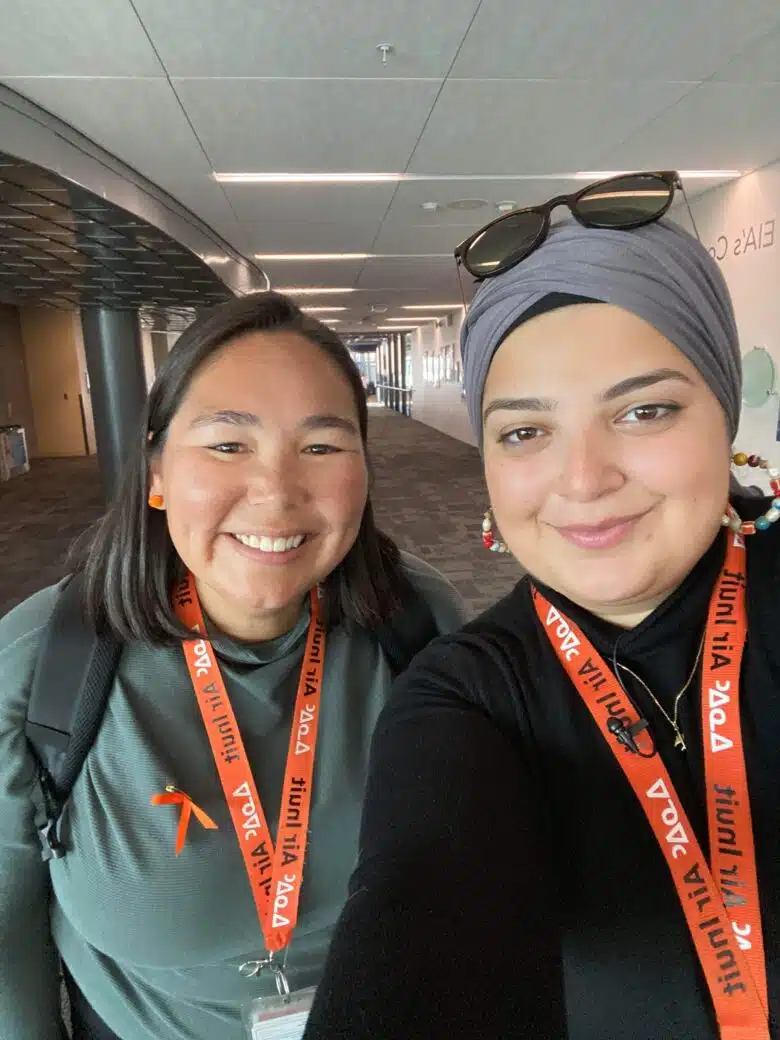
Melissa Haney (left) and Nour Utayim (right) travelling to Edmonton for the Elevate Aviation Gala in 2022, where Nour was featured for the Inspire Award. © Photo courtesy Melissa Haney
The first Inuk woman to become a captain of a passenger jet, Melissa was a speaker at the event and says she remembers Nour’s enthusiasm and curiosity.
“She wanted to know everything about aviation and all the speakers’ stories,” Melissa recalls. “I was kind of drawn to her and her energy.”
“I’m so proud of her for what she’s doing and what she’s done.”
The two kept in touch afterwards and it was Melissa who told Nour about the job opening at Air Inuit.
“I’m so proud of her for what she’s doing and what she’s done,” says Melissa. “She’s fearless.”
For Nour, it all comes down to luck and grit.
“I feel like I got very lucky. But I was also very motivated,” Nour says.
“If you take one of these factors out of the equation, it wouldn’t have worked. If I were motivated, but wasn’t lucky enough to be sponsored here, it wouldn’t have worked. And if I was lucky enough to be sponsored, but I wasn’t motivated enough to go to flight school and save money and all that, it wouldn’t have worked either.”



